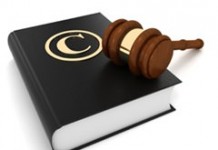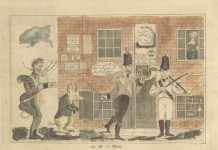![]() It appears the SFWA went into full rethink mode after its latest blunder, the removal of books from the net to which it did not own the copyrights, and today president Michael Capobianco came out with a remarkable statement. The main thrust is that the SFWA now recognizes the author’s rights to control their own copyrights:
It appears the SFWA went into full rethink mode after its latest blunder, the removal of books from the net to which it did not own the copyrights, and today president Michael Capobianco came out with a remarkable statement. The main thrust is that the SFWA now recognizes the author’s rights to control their own copyrights:
The most fundamental author’s right is the right to control who can make copies of his or her work. This includes the right to license works through Creative Commons, give them away, license them to publishers for money, or any other creative use that an author can devise. The author is the one that gets to choose how and when, no one else.
I don’t know if Capobianco is aware of this, but the phrase “author’s rights” has a very specific meaning in the English language, namely the intrinsic rights an author has. USA law denies that there are such intrinsic rights—correctly, in my opinion—and it is therefore a bit strange that once again the SFWA’s philosopy seems to run counter to the law of the land. Perhaps they are thinking of future law. Nevertheless, I congratulate the SFWA for confirming explicitly that it is the authors, not the writers’ associations (or publishers, or whomever) who own and control their copyrights. In a time when the popularity of written, printed fiction appears to be in a steady decline, and where a larger percentage of works than ever is being kept from the public domain, it is important that authors can follow their own paths.
(Via John Scalzi.)


































Branko:
Can you be more specific about which intrinsic rights you feel that USA law denies to the author? I thought US copyright law was pretty specific? I await your response, but in the meantime it seems to me that Copobianco’s statement expresses the spirit of our US laws.
Sure. As I said, in the English language the phrase “author’s rights” refers to a large set of rights that are typically divided into economic and so-called moral rights. Examples of the latter are the “right” to be recognised as the author of a work you created, the “right” not to have a work mutilated, and so on.
In countries that recognize these so-called moral rights, the makers of copyright laws typically hold that these are intrinsic, human rights. They are, according to these law-makers, rights that an author has whether these rights are enshrined in law or not. (Although of course no government will recognize these rights as long as they are not enshrined in law.)
US law, as enshrined by its constitution, and as explained by its framers, does not hold that any of these rights are intrinsic, be they economic or “moral”. Instead, the constitution clearly states that they are the state’s to grant and the state’s to withdraw, and if the state does not grant these rights, they do not exist.
I think you’re missing something. SFWA screwed up, yes, but in their implementation of what they were doing, not in their authorization to do it. It was authorized by the authors (or estates) it was trying to act on behalf of. It (well, Burt) just acted in a really stupid way…
The SFWA bullied Scribd.com into “censoring” authors. These authors had not given permission to do so.
Branko,
When the US Congress attempted to ‘square up’ US law with the Berne Convention, they held that section 43 of the Lanham Act already protects an authors right to attribution, therefore it did not need to be restated in the copyright laws I’ve linked above and below. Additionally it was held that this law would prohibit the publishing of a ‘multilated’ (your word) work under the original author’s name; this was upheld in Granz v. Harris which essentially held that it was unfair competition to present an abridged work under the original author’s name. Courts have also held that “it is an actionable wrong to hold out the artist as author of a version which substantially departs from the original.” Also note that our Title 17, S106 in the US copyright law I already linked, which says it is the copyright-holder’s exclusive right to prepare or authorize derivative works based on the copyrighted work. Obviously, copyright vests initially in the author or authors of the original work (S201).
In your evaluation of our US Constution, I wasn’t quite sure whether you meant ‘state’ as being our federal government, or the individual state governments within it. Just to clarify, Article 1, Section 8 of our Constitution specifically gives the national Congress (ie Federal government) the power and duty “To promote the Progress of Science and useful Arts, by securing for limited Times to Authors and Inventors the exclusive Right to their respective Writings and Discoveries”. However I wonder if you were really talking about paragraph {c} of our Title 17, S104? Either way, I’m not a lawyer either, but I think there’s a good case to be made that US federal law does try to protect the ‘authors moral rights’ you’re discussing.
I can see where there may be other situations that are not addressed as fully in US law the same as they are in the laws of other countries. But all of this, while interesting, is pretty far outside of what Capobianco was talking about. He was referring specifically to an author’s right to control who makes copies of his work; this is clearly protected in S106 as linked above.
“I think there’s a good case to be made that US federal law does try to protect the ‘authors moral rights’ you’re discussing.”
Indeed. It just isn’t part of copyright law. I have a right to my reputation regardless of whether I am not an author.
“But all of this, while interesting, is pretty far outside of what Capobianco was talking about.”
Hm, you’re probably right there. He says that “SFWA stands for the author’s rights,” not “SFWA stands for author’s rights“. I must have glossed over that.
Branko:
I can’t tell whther that last response was sarcasm, or not. So I’ll assume not, unless you say otherwise.
No, it wasn’t sarcasm, I think I made a genuine mistake.